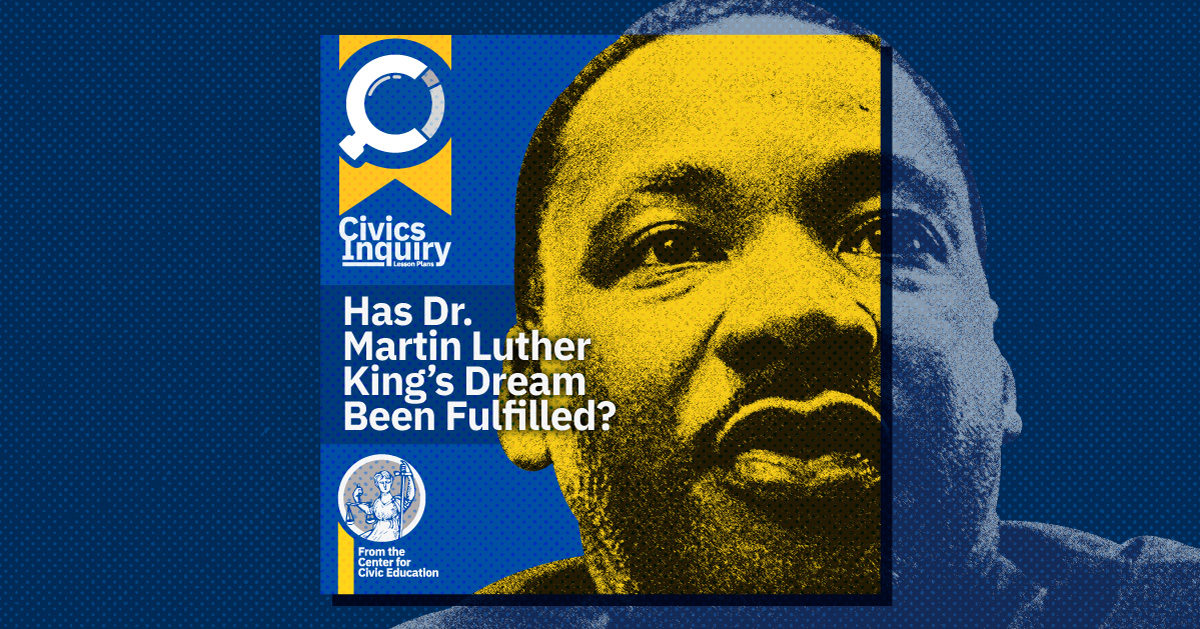
Has Dr. Martin Luther King's Legacy Been Fulfilled?
While Dr. Martin Luther King Jr. is arguably the most well-known figure of the civil rights movement, many do not fully comprehend his impact on the lives of Americans. Teaching about Dr. King is essential for students to understand the struggle for civil rights that continued even today. It honors diversity and explores the values of justice. Allowing students to read and listen to Dr. King’s words helps them understand the power of taking informed action.
Pre-Lesson Preparation
Has Dr. Martin Luther King’s dream been fulfilled?
- What was Dr. King’s dream?
- What accomplishments were achieved, and what obstacles were faced by Dr. King?
- How does Dr. King’s legacy impact your life?
Day 1
- What Is the American Dream: Resource Bank (Optional)
- MLK’s Mind Map (Organizer)
- “I Have A Dream” Speech Annotation Activity
- “I Have a Dream” (Speech Transcript)
- Freedom’s Ring King’s “I Have a Dream” Speech (11:24-17:08)
- MLK’s Dream (Slide Deck)
- Martin’s Big Words Book Cover (Image)
- Martin’s Big Words: The Life of Dr. Martin Luther King, Jr. read by Jeff Perry (Video)
- Martin Luther King, Jr. Memorial in Washington, D.C. (Image)
- MLK Keep Moving Quote (Image)
- Investigation Slide Decks
- Keys to the Investigation (Graphic Organizer)
- Tip the Scales (Assessment Tool)
- Student Civil Rights Activism: Crash Course Black American History #37 (Video)
- MLK Doing for Others Quote (Image)
- Hexagonal Thinking Template
- Making MLK Connections
- Poster paper, tape/glue, and sticky notes
- Dr. King's Dream: Inquiry Assessment Rubric
- Inquiry Reflection Tool
- boycott The act of refusing to buy or engage the services of an organization or person.
- desegregation The process of ending the separation of different racial, religious, or cultural groups.
- racial integration The process of ending racism.
- racism The belief that people who belong to certain races are naturally inferior to others.
- segregation Keeping people apart; generally as a form of discrimination based on race, religion, gender, or culture.
While Dr. Martin Luther King Jr. is arguably the most well-known figure of the civil rights movement, many do not fully comprehend the impact that Dr. King has had on the lives of Americans. Although our nation honors his birth with a federal holiday, it is critical that educators elevate Dr. King’s accomplishments to more than a day in January or a mention during Black History Month. Teaching about Dr. King is essential for our students to understand the ongoing struggle for civil rights that still plagues our nation today and allows educators to honor diversity and explore the values of justice. Providing students the opportunity to read and listen to Dr. King’s words helps them to understand the power of taking informed action.
When educators provide high-quality primary-source materials and opportunities for students’ agency, we can begin to dismantle misconceptions and preconceived notions. Empowering students to conduct investigations, analyze evidence, and make claims based on their research elevates learning and critical thinking skills.
Teachers can find additional background support resources as follows:
- Votes for All Men, the Constitution EXPLAINED, Center for Civic Education (Video)
- Civil Rights Movements and Assembly, 60-Second Civics, Center for Civic Education (Video)
- Dr. Martin Luther King Jr.'s Six Principles of Nonviolence (series), 60-Second Civics, Center for Civic Education (Video)
- Martin Luther King, Jr: Crash Course Black American History #36 (Video)
- Randolph, Rustin, & the Origins of the March on Washington: Crash Course Black American History #32 (Video)
- The Montgomery Bus Boycott: Crash Course Black American History #35 (Video)
- The Civil Rights Act of 1964, U.S. National Archives, Google Arts & Culture
Teachers should note the suggestions for advanced preparation of the lesson activities for Day 3.
This lesson contains material about racism that some students might find offensive or potentially traumatizing. This material has been included to give students a sense of the civil rights era and the obstacles faced by campaigners for civil rights. A culturally responsive classroom will provide a welcoming and safe environment where students feel comfortable discussing difficult topics. Ensure that students feel comfortable sharing appropriate personal perspectives. Consider establishing classroom norms that encourage discussion.






